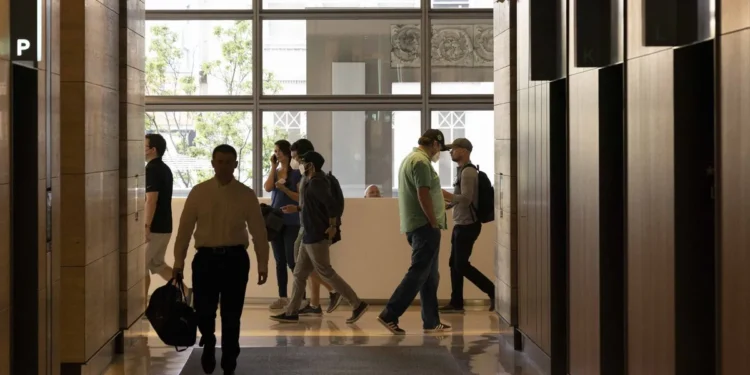Seattle and its largest union reached a settlement agreement allowing some city employees to work from the office two days per week, with manager approval, despite city policy requiring three days of at least four hours in-office.
The settlement, struck following a PROTEC17 grievance, allows workers to stack two four-hour office blocks consecutively, turning eight hours in-office into two days if managers approve.
Mayor Bruce Harrell’s office downplayed the language, stating workers could already craft alternative work arrangements with managers. However, the settlement makes the stacking option explicit for the first time.
The push for government workers to return to offices built momentum in early 2024 as a new slate of council members took office. Council President Sara Nelson swiftly required legislative staff to work in-office. The executive branch moved slower, but Harrell ultimately mandated in-person work in summer 2024 alongside King County and Sound Transit.
The move, framed as increasing collaboration and improving office culture, was cheered by downtown business interests as a strong precedent for other employers, with 37% of downtown office space remaining vacant. It would also bring more foot traffic to downtown businesses relying on office workers for lunch, shopping, or happy hours.
“This is an important move by the mayor that’s good for the city, the public and for downtown,” Jon Scholes, Downtown Seattle Association president and CEO, said at the time.
The edict was poorly received by PROTEC17 workers, contributing to their decision to back Harrell opponent Katie Wilson.
In January, the union filed a grievance after members were told they had to be in-office for eight hours. Union leaders pointed to contract language defining “in office” days as four hours. The contract does not address stacking blocks.
Managers can require employees to work longer hours in-office when in-person work is necessary, such as for conferences or all-staff meetings.
The city’s labor relations manager denied the grievance, so the union took it to arbitration in February. Those negotiations resulted in the settlement signed September 20.
Steven Pray, PROTEC17 union representative, said many city employees already work in-person, such as line workers and construction crews. Others are unlikely to only work four hours in-office then leave.
“This is not turning the city upside down on its head,” he said. But for someone commuting long distances, they may shave a day off their travel schedules if managers agree.
Pray said it’s unclear how many workers will utilize the new language. “I have heard from some members who have been approved and from others who have had their requests denied,” he said.
The union filed the grievance because the city, by requiring eight-hour shifts, was violating the contract stating “four hours work shall constitute an ‘in office’ shift,” Pray said. “We have an obligation to defend the contract language.”
Harrell spokesperson Jamie Housen downplayed the settlement’s impact. “Simply stated, this settlement does not substantively change current practice in evaluating and, when appropriate, granting alternate work agreements,” he said.







